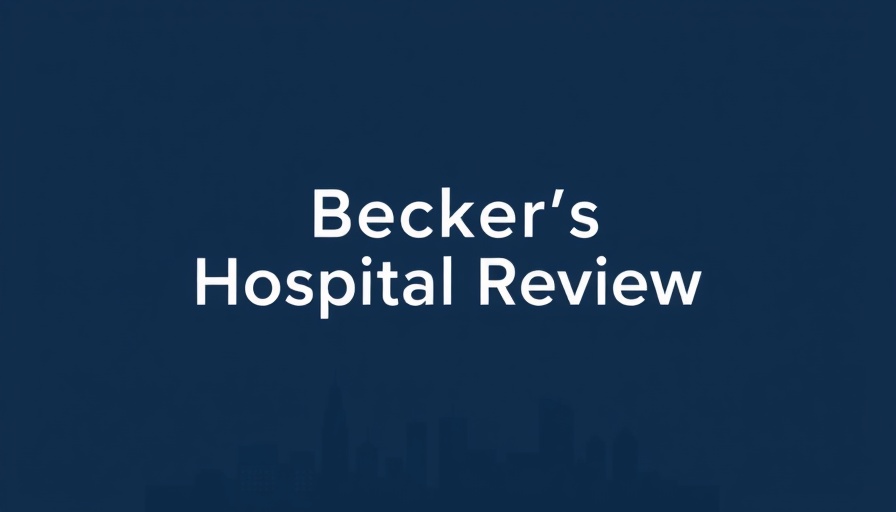
Transforming Healthcare: A Look Ahead
The landscape of healthcare is dramatically evolving. As hospitals and health systems navigate significant challenges such as labor shortages, financial constraints, and rising patient expectations, leaders are increasingly relying on artificial intelligence (AI) and digital innovation to reshape care delivery. This promise is not just to fill staffing gaps, but to fundamentally redesign how healthcare operates on every level—from administrative tasks to patient interactions.
Five Bold Predictions for the Future Workforce
At a recent CEO+CFO Roundtable, top executives shared their insights on how the healthcare workforce will evolve. Here are five predictions that highlight the upcoming changes:
The Workforce Shrinkage and Shift
As healthcare migrates beyond traditional hospital settings, the workforce is adapting. Derek Goebel, CFO of Altru Health System, emphasizes the growing demand for 'on-demand' care services, which is reshaping workforce models. Innovative tools such as AI are being leveraged to enhance efficiency and fill gaps caused by staffing shortages. Employing these technologies allows hospitals to maintain a lean workforce while promoting effective care delivery.
Embracing AI Literacy as a Necessity
With the rapid advancement of AI in healthcare, literacy in these technologies is vital. As AI becomes a prominent part of healthcare operations, organizations like the Mayo Clinic are investing in educational programs to ensure that all team members can integrate AI into their daily roles. This initiative helps clinicians enhance their skills while bridging the gap between clinical expertise and technological advancements.
Empowerment Through Upskilling
Health systems are not stopping with training; they're fostering a culture of empowerment. By encouraging continuous learning and upskilling, employees are becoming leaders in their own right. Biju Samkutty, COO of Mayo Clinic, reveals how his organization prioritizes the development of strategic leaders who adeptly use technology to elevate patient care. This approach promises better outcomes and greater job satisfaction for healthcare professionals.
Reimagining Consumer Touchpoints
The focus on consumer engagement is evolving. With patients expecting more personalized experiences, health systems must adapt their service delivery models. Implementing patient engagement tools and telehealth solutions will be vital to meeting these expectations. By enhancing communication and services, providers can not only attract but retain patients in a highly competitive market.
Streamlining Operations for Efficiency
To thrive in the future, healthcare organizations will need to optimize operations through automation. From reducing missed call rates with AI phone agents to refining medical office workflows, these technologies can help practices enhance their efficiency and profitability. Embracing practice automation can lead to significant savings and improved patient experiences, all while ensuring compliance with healthcare regulations.
Actionable Insights for Healthcare Providers
The predictions for the healthcare workforce highlight a clear trajectory towards technology-driven practices. To stay ahead of these trends, healthcare providers should consider implementing:
- Digital Front Desks: Streamlining communication and scheduling through digital solutions can significantly enhance the patient experience.
- AI-Enhanced Services: Integrating AI tools in various service lines can improve operational efficiency and facilitate better care outcomes.
- Training Programs: Investing in ongoing education to bridge the clinical and technological knowledge gap will empower staff and ensure adaptability to changes.
Conclusion: Preparing for Tomorrow’s Workforce
As the healthcare workforce continues to evolve, understanding these predictions is crucial for independent physicians, nurse practitioners, and other healthcare providers. By embracing technological advancements and focusing on continuous improvement in skills and patient interactions, they can navigate the changing landscape effectively. Now is the time to take proactive steps towards integrating these insights into practice to optimize outcomes and enhance patient satisfaction.
For healthcare professionals looking to enhance their knowledge in areas like remote therapeutic monitoring, practice automation, and employee health benefits, it's essential to stay informed about the latest trends and tools. Join the conversation and explore innovative solutions that can benefit your practice today!
 Add Row
Add Row  Add
Add 




 Add Row
Add Row  Add
Add 

Write A Comment